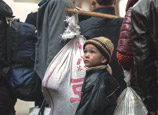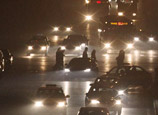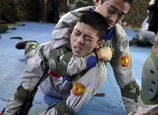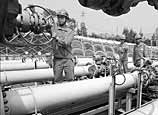
"I don't want my children to grow up in the polluted environment," he said, adding he did not expect the government to change the situation soon, as battling air pollution is a long-term task.
People on the Internet have mocked the smog as "the dirtiest air in history" in Beijing as well as other cities that are also shrouded by haze.
The Beijing Emergency Medical Center received 535 patients with respiratory diseases from Jan. 7 to 14, or 54 percent more than the same period of last year.
Experts believe the serious air pollution Beijing is facing is one of the costs of rapid urban development.
Beijing's population hit 20.69 million by the end of 2012, an increase of 500,000 people year on year, according to the Beijing Municipal Statistics Bureau. The number of vehicles in the city reached 5.2 million at the end of 2012, with the number of private cars still on the rise.
Wei Tianni, deputy chief with Beijing City No. 6 Hospital, said human beings exposed to polluted air for a long time may catch lung cancer.
Figures show the incidence of lung cancer in Beijing surged 56 percent from 2001 to stand at 62.68 per 100,000 members of the population in 2010.
Wei, also a deputy to the Beijing Municipal People's Congress, suggested that Beijing should learn lessons from London, where the Great Smog left thousands of people dead in 1952, and take sustainable methods to develop.
"'Beijing cough' is not a term we are proud of," said Wei. "We should reflect why decades later we still fail to learn lessons from the incident in London."
















 This is the most real, most helpless and most motivate life expense of Beijing!
This is the most real, most helpless and most motivate life expense of Beijing!


![]()
